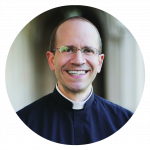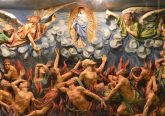Saintly Intercession
Can we ask for the intercession of our deceased relatives and friends, or is such prayer proper only to canonized saints?
When we think of prayers and the deceased, we likely think of praying for our deceased family members and friends. But is it possible to pray to the dead by invoking the intercession of those who have gone before us, who we hope are in heaven?
HOLY MEN AND WOMEN
Catholics have a long tradition of invoking the heavenly aid of holy men and women. This tradition of intercession extends back to the Church’s earliest days when martyrs’ prayers were invoked, especially on the anniversaries of their deaths.
In these early years, there was no official process for being declared a saint, but a kind of unofficial canonization was based primarily on the deceased’s fame and the people’s consensus. Non-martyrs were eventually viewed as models of sanctity, and prayers for their intercession ensued.
The prayers offered included those attached to the liturgy (as seen in the prayers of the Mass) and other forms of public and private devotion, such as litanies and reliance on patron saints of places and causes.
PRIVATE PRAYERS
As the canonization process became established, the Church emphasized publicly invoking aid only from those officially recognized as saints. The law of the Church further developed to distinguish between public veneration of holy persons, which is proper only to saints and blesseds (those near to canonization), and private prayers for intercession (Code of Canon Law, 1187).
Consequently, invoking the aid of deceased family and friends is laudable, but not as part of the Church’s public prayer Public prayers can be made for the dead but not for their intercession.
ALL THE SAINTS
While the number of official saints and blesseds continues to grow every year, there are countless more souls in heaven. As we pray in the Apostles’ Creed, “I believe in … the communion of saints.” This statement—conceived far before the official canonization process began in the Church—posits a belief in an entire community of saints, known and unknown. It is consistent with our faith to trust that we have many deceased relatives and friends in heaven. Though their lives may not be well known, they who lived virtuous lives on earth can be seen as models of imitation and veneration.
These innumerable souls are among the “great cloud of witnesses” in heaven (Heb. 12:1), who we recognize on the Solemnity of All Saints (Nov. 1). On this day, the Church celebrates the total number of saints, including members of our communities, parishes and families. We can petition for the intercession of all in heaven, and we invoke on this day in particular, “the prayers of so many intercessors” (Collect for the Solemnity of All Saints).
PRAY FOR US
The traditional understanding of saintly mediation is not that the saints grant favors themselves, but that they make intercession on our behalf. Saints—whether officially recognized as such or not—are in the presence of Christ. In our private prayers, we may ask our deceased family and friends to pray for us using the words associated with saintly intercession: “Pray for us.”
 Father David Endres is professor of Church history and historical theology at Mount St. Mary’s Seminary & School of Theology.
Father David Endres is professor of Church history and historical theology at Mount St. Mary’s Seminary & School of Theology.
This article appeared in the November 2023 edition of The Catholic Telegraph Magazine. For your complimentary subscription, click here.













